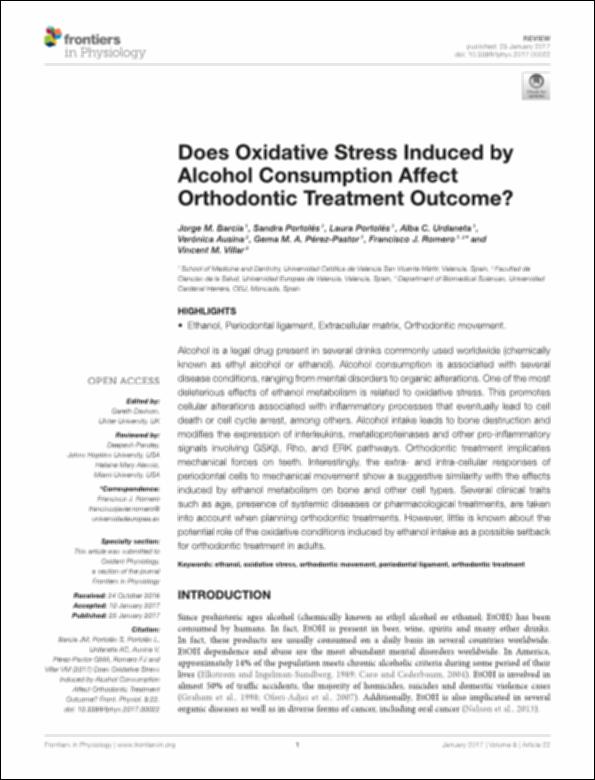Please use this identifier to cite or link to this item:
http://hdl.handle.net/10637/13289Does oxidative stress induced by alcohol consumption affect orthodontic treatment outcome?
| Title: | Does oxidative stress induced by alcohol consumption affect orthodontic treatment outcome? |
| Authors : | Barcia González, Jorge Miguel Portolés, Sandra Portolés, Laura Urdaneta, Alba C. Ausina, Verónica Pérez Pastor, Gema M. A. Romero Gómez, Francisco Javier Villar Amigó, Vicente |
| Keywords: | Alcohol - Efectos secundarios.; Oxidative stress.; Orthodontics.; Estrés oxidativo.; Ortodoncia.; Alcohol - Side effects. |
| Publisher: | Frontiers Media. |
| Citation: | Barcia, J.M., Portolés, S., Portolés, L., Urdaneta, A.C., Ausina, V., Pérez-Pastor, G.M.A., Romero, F.J. & Villar, V.M. (2017). Does oxidative stress induced by alcohol consumption affect orthodontic treatment outcome?. Frontiers in Physiology, vol. 8, art. 22 (25 jan.). DOI: https://doi.org/10.3389/fphys.2017.00022 |
| Abstract: | Alcohol is a legal drug present in several drinks commonly used worldwide (chemically known as ethyl alcohol or ethanol). Alcohol consumption is associated with several disease conditions, ranging from mental disorders to organic alterations. One of the most deleterious effects of ethanol metabolism is related to oxidative stress. This promotes cellular alterations associated with inflammatory processes that eventually lead to cell death or cell cycle arrest, among others. Alcohol intake leads to bone destruction and modifies the expression of interleukins, metalloproteinases and other pro-inflammatory signals involving GSKβ, Rho, and ERK pathways. Orthodontic treatment implicates mechanical forces on teeth. Interestingly, the extra- and intra-cellular responses of periodontal cells to mechanical movement show a suggestive similarity with the effects induced by ethanol metabolism on bone and other cell types. Several clinical traits such as age, presence of systemic diseases or pharmacological treatments, are taken into account when planning orthodontic treatments. However, little is known about the potential role of the oxidative conditions induced by ethanol intake as a possible setback for orthodontic treatment in adults. |
| Description: | Este artículo se encuentra disponible en la siguiente URL: https://www.frontiersin.org/articles/10.3389/fphys.2017.00022/full |
| URI: | http://hdl.handle.net/10637/13289 |
| Rights : | http://creativecommons.org/licenses/by/4.0/deed.es |
| ISSN: | 1664-042X (Electrónico) |
| Issue Date: | 25-Jan-2017 |
| Center : | Universidad Cardenal Herrera-CEU |
| Appears in Collections: | Dpto. Ciencias Biomédicas |
Items in DSpace are protected by copyright, with all rights reserved, unless otherwise indicated.


